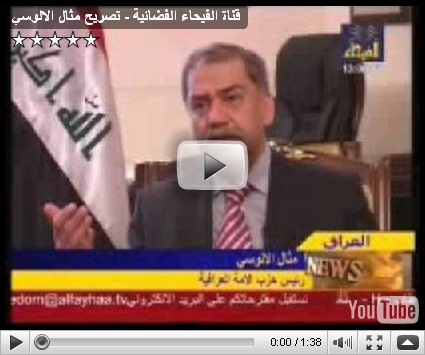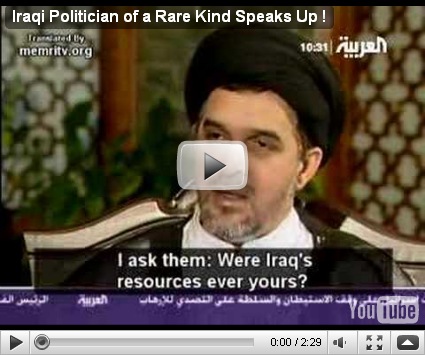
Without going into the right or wrong of his doing related to that visit, the man made his visit public, but it was his fault for being honest. It is no secret nowadays the number of Iraqi and Arab politicians already visited Israel secretly in the past years, in peace and war times, and many made trade and economic deals behind the curtains with Israeli officials, while in public showed resentment, or at least rejection to the idea of having normal relations with Israel. So, what is the big deal?
Before I continue, I tried not to start this post on al-Alusi by writing about his visit to Israel. I did not want to sound like another media trumpet when talking about this politician, but I fell in the trap! It was not intentional.
Anyway, there no single person can ignore or even try to deny the fact that Mithal al-Alusi is one of the most outspoken figures among Iraq's politicians. To take the matter to extreme negativity, some describe him as being rude or ruthless - on a side note, some call it a good attitude depending on the situation. His outbursts at journalists and his reaction to questions during TV interviews on a number of occasions is resulted in mixed reactions, not to forget the reaction to his strong presence during meetings in the parliament.
The look at this man's face gives one indication: frustration mixed with anger, a lot of anger, but with sadness, in fact a lot of grief. I don't blame him, as one of the turning points of Mr. al-Alusi's life took place in 2005 when unknown armed men ambushed his convoy in western Baghdad in an assassination attempt, which resulted in killing two of al-Alusy's sons, Ayman, 29, and Jamal, 24, along with a bodyguard. Two years later, Culture Minister then, Asaad al-Hashimi, has been identified as the kingpin behind the killing and was convicted in absentee - Asaad al-Hashimi is now under arrest by an Arab government and should be returned to Iraq in the near future, unless...
I might disagree, and say that al-Alusi's facial expression of grief and anger are merely an expression of frustration towards the situation in Iraq, a bizarre situation where only "open-minded" Iraqis would share and agree to mourn, and to some extent explode from agony.
When I say "open-minded", I am referring to those people who did not align themselves with some who took the news of the killing of al-Alusi's sons as an opportunity to take moral revenge or gloating, by saying "he deserve it, that traitor, because of his visit to Israel." This is non-sense, and inhuman, well, it is common that human value in Arab countries is considered the least to think about - Bush used Arab countries for the torturing and bring up confessions out of his Crusade war prisoners, remember? George W. Bush realize such fact and used it effectively.
Maybe for the above reasons Prime Minister al Malaki asked Mithal al-Alusi (twice?!) to take the position of head of Intelligence and Security system of Iraq. He declined the offer.
Al-Alusi political history is no secret, full of struggle regarding his opposition to the dictatorship of Saddam Hussain. He is affirmative and determine, for example, in December 2002, he was involved in the takeover of the Iraqi embassy in Berlin to protest Saddam's tyranny, and was convicted of hostage taking by a German court and sentenced to three years in jail. His sentence was later reduced to house arrest. After the fall of former regime in Iraq al-Alusi went back to Iraq and resumed his political career with some obstacles here and there due to his outspoken nature, but to all al-Alusi is not just another politician who used to live in exile (Germany), like many we know and heard about, who used to live on social benefits from his host country (and donations from sources with foreign agenda's), while attending meetings and conference to outset the then dictatorship in Iraq.
But... What can Mr. Alusi do for the future of Iraq?
Is he the right person for Iraq?
Iraq needs a strong man to rule, bring people altogether united. Iraq needs ONE figure to clean up the mess, at least for the coming period, at least for the coming 4 to 8 years, especially after the political, social, economic chaos we witnessed after the invasion of US forces and the sectarian violence engulfed the nation and fed by God knows who from east and west.
Wait… I don't want to be misunderstood, Iraq does not need another Saddam, and will never have another Saddam for many years to come, and maybe will never come. Iraq needs a strong political figure with a lot of power, a man who can compensate Iraqis for what they have suffered all the years that gone, but at the same time he can and without hesitation ram his fist do hard down and with might on those who dare to play with the fate of Iraq and the Iraqis.
Unfortunately I did not see that in current prime minister, people praise al-Maliki for being a nice man with nice personality (some call him merciful!), but did not describe him as being powerful, strict, decisive, and I don’t buy these calls by some who align him with promoting law and order, because reality showed that there is none exists in Iraq.
To the contrary, the qualities of power, determination and baldness all apply to Mithal al-Alusi, yet, many agree that other things goes hand in hand and Mr. al-Alusi has two weaknesses: The first I already mentioned, his renounced visit to Israel. In my opinion, Isreal is not the United States, neither it is South Africa to just turn the page and starts with another chapter and a new reality. The Arab-Israeli conflict is a complex issue, take a look at what happened after Sadat of Egypt made his move in the late 1970’s, the move was not prepared, the people and citizens are not prepared.
The second point taken against al-Alusi is what some people call it "the political mood of Mithal al-Alusi", or "the quick change of heart regarding Iraq's political scene", as others put it.
To start with, I don't recall someone calls al-Alusi with being Ba'athist, I doubt that someone would dare to do as such, and I laugh when someone dare to call al-Alusi as being Ba'athist, because this show the level of ignorance such a person has, especially that he was one of the founding members of the committee responsible for chasing Saddam's followers after 2003, as I read... but wait, he might get branded with that, is it maybe due to his thick mustache?
Anyway, al-Alusi does not believe in reconciliation, just a one-shot-and-go type of person - maybe this is one of the differences between this man and former prime minister, Ayad Allawy. In addition, Al-Alusi is not a fan of the concept and principle of Arab unity. Further more, he accuses the Arabs of being the portal for the U.S and western allies used to attack Iraq, thus, for the misery Iraq has plagued with. Mithal al-Alusi is a patriotic, meaning Iraq is the first and last priority. He is known for saying "If the interest of Iraq is found deep in hell, I will go there for the sake of this interest". In addition, he shares with his fellow politician Ayad Jamal Al-Din loath and strong hostility towards Iran, because of Iran's interference in Iraq's internal affairs. He shares with Ayad Allawy, though, the idea that Iraq must have a secular government i.e. rejects having religion and politics on the same table, in spite of his strong ties with religious and tribal leaders all over Iraq. Having said the above, it all makes a very complicated formula, in fact, it makes the voter confused by such a figure, taking every point I took independently and deeply into a long and vast argument.
This post is just sharing my thoughts on another distinguished political figure in Iraq, and not to promote another politician. Last time I talked about Ayad Jamal al-Din, tomorrow might be the turn to write about another politician. I would like to share my thoughts and ideas with my friends and fellow bloggers, and to exchange ideas.
On this occasion, having people exchanging their thoughts on the future of Iraq is important, the most important thing for the sake of the people who suffered a lot from wars, dictatorship, death, loss, occupation, being a victim of other’s selfish desire…etc
Above all, we all did see the current government and its conduct in the past 4 years.
I believe it is time for change.
The below video al-Alusi talks about the assassination attempt that killed his both son’s









